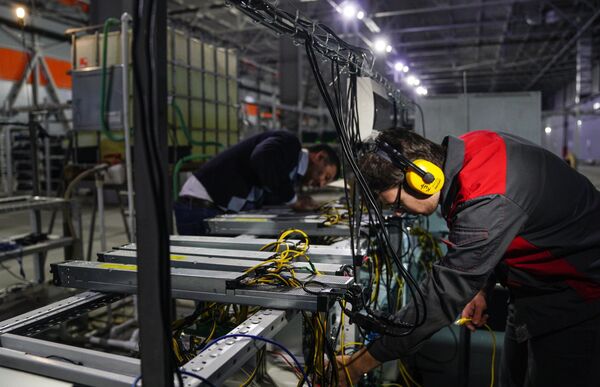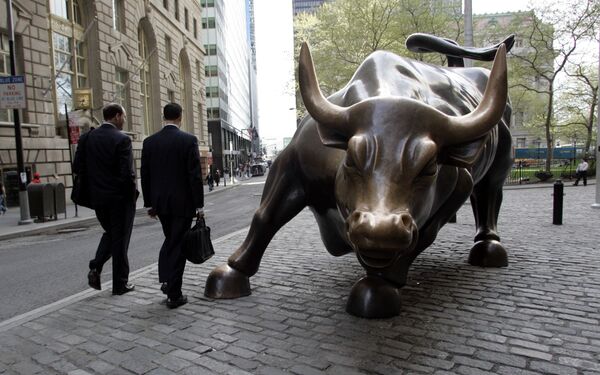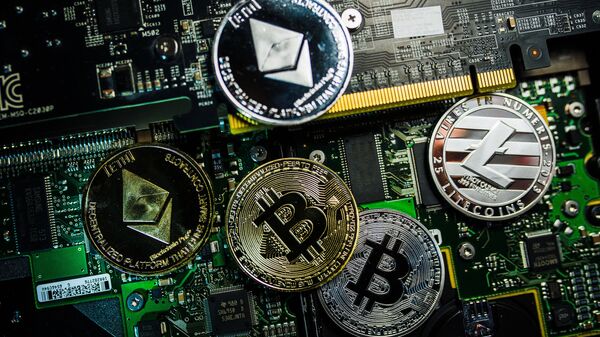When used for ill-gotten gains bitcoin poses a grave threat to national currencies, says Tom McGregor, a Beijing-based political analyst and Asia-Pacific commentator for China's national TV broadcaster CNTV, adding that it is no coincidence that George Soros, the man who "broke the Bank of England," has recently turned to the cryptocurrency.
"It's like a pyramid scheme, where you can con so many people to pour their cash into bitcoin and national currencies can be depleted, especially from poor countries that face the biggest dangers from bitcoin," the analyst opined.
The analyst warned that if such an incident occurs "that would spark a financial crisis of mammoth proportions, but without any protections from governments since global currencies were swept into the bitcoin craze."
What's Behind Bitcoin's Popularity
The analyst explained why so many people find the decentralized digital currency, which works without a central bank or single administrator, attractive. The truth of the matter is that the world's currencies are highly regulated and all holdings of cash can be traced and taxed.
"From an ethical standpoint, should you be required to report every single penny of your cash holdings, even if obtained under legal grounds?" he asked rhetorically. "For many people, such concerns have caused some people to take different measures to tackle the problem."
Indeed, the cryptocurrency's benefits seem obvious: It's much easier to transfer bitcoin from one country to another avoiding bank wires and currency exchange fees; and "if you have a large supply of cash on hand then purchasing bitcoin to transfer the funds may seem like a better idea than going to a bank and filling out paperwork to process it," the analyst pointed out.

Why Beijing is Highly Skeptical About Cryptocurrencies
The CNTV commentator recalled that once he was approached by a Japanese bitcoin investor who asked to make a story for the Chinese media about bitcoin and argued that cryptocurrencies "are hack-proof for account holders and he had been instrumental to develop an algorithm to keep cryptocurrencies permanently functional."
However, according to McGregor, the Chinese government is very skeptical about the digital currency and for good reason.
"Beijing was fearful of the legal issues involved," the analyst explained. "Bitcoin is not backed by a sovereign government and stands the risk of getting valued at zero in a worst case scenario, since it was not protected by the government or anything like hard assets, such as gold, silver or other metals."
On the other hand, there are further challenges about reporting bitcoin for taxation, as well as forfeiture seizures when digital coins had been used when crimes were committed, he noted, warning that there is also the possibility that one can create fake accounts on cryptocurrency exchanges.
"A zombie bitcoin holder can help criminals hide their bitcoin holdings, as they can deny having the illegal cash, since a fake account holder has bitcoin instead," McGregor highlighted.

George Soros, Wall Street Tycoons Warming Up to Bitcoin
Speaking to CNBC on May 7, Microsoft co-founder Bill Gates called bitcoin and ICOs (initial coin offering) "[some] of the crazier, speculative things."
So spoke American billionaire George Soros in January 2018, dubbing virtual coins a bubble. However, on April 6 Bloomberg broke that Soros' $26 billion family office was reportedly preparing to trade cryptocurrencies.
The news caught many by surprise since digital coins have shown extraordinary volatility over recent months, with bitcoin plummeting from last year's high of $20,000 to about $6,600 in early April. In May, bitcoin has been fluctuating around $9,000 following reports that Soros has stepped in.
Meanwhile, Goldman Sachs signaled in early May that it was going to offer bitcoin derivatives trading. For its part, Intercontinental Exchange (ICE), the parent company of the New York Stock Exchange, "has been working on an online trading platform that would allow large investors to buy and hold bitcoin, The New York Times reported on May 7.
"Some of the biggest names on Wall Street are warming up to bitcoin, a virtual currency that for nearly a decade has been consigned to the unregulated fringes of the financial world," the media outlet highlighted.

"Both Goldman Sachs and Soros are well known as 'pump and dump' investors. The scheme works this way: Buy low, sell high," McGregor said, commenting on the matter. According to the analyst, wolves of Wall Street are unlikely to use bitcoin for long-term investments: They spur public interest in the cryptocurrency, wait until the digital coins reach their peak and then take their profit, he suggested.
Bitcoin as a Potential Tool of Funding 'Color Revolutions'
McGregor noted that bitcoin appears to be a perfect tool for Soros's numerous NGOs, which have been spotted fomenting "color revolutions" in many parts of the world.
Stressing that he was not saying that Soros and his NGOs would ever engage in illegal and unethical actions, the Beijing-based commentator suggested that one could hypothetically push ahead with grand money laundering schemes and covert transfer of funds with the help of bitcoin.
On the other hand, charity fraudsters could jump at the opportunity to convert their money into digital coins and escape punishment by hiding all traces, McGregor added.
'Stay Away From Bitcoin, Rely on the Big 5'
"I would strongly advise against any bitcoin holdings and when anybody asks me about it, I tell them to stay away like it's death chasing after you," the political analyst said. "Don't trust bitcoin for a second, because no sovereign government can back it. You stand the risk of your bitcoin getting hacked as well, which has happened to some account holders already."
According to McGregor, developing countries and their populations need to focus on reliable assets. One could speculate on national currencies, he noted, suggesting that the best bets remain the Big 5 — the US dollar, Japanese yen, Chinese yuan, British pound and the euro. "You can trade in currencies of the emerging markets, but they come at higher risk and volatility in values," the analyst warned.
The views and opinions expressed by Tom McGregor and Ekaterina Blinova are those of the contributors and do not necessarily reflect those of Sputnik.




